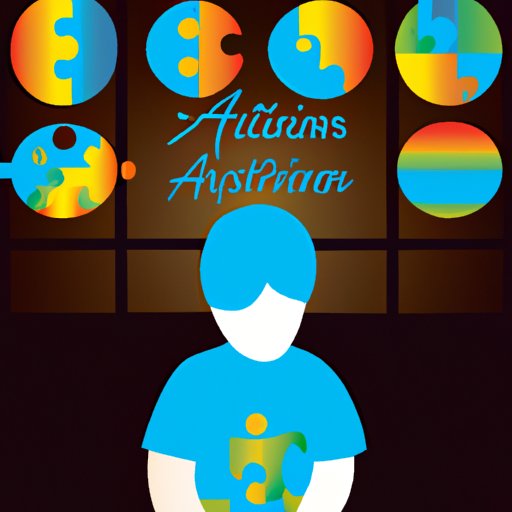Introduction
Autism Spectrum Disorder (ASD) is a neurodevelopmental disorder that affects an individual’s social, communication, and behavior skills. It is a lifelong condition that affects 1 in 54 children in the United States, according to the Centers for Disease Control and Prevention. Mental health refers to a person’s overall emotional and psychological wellbeing. People with autism often experience mental health issues such as anxiety, depression, and obsessive-compulsive disorder.
The relationship between autism and mental health is complex and multifaceted. This article will explore this relationship, looking at the role of mental health in autism, the impact of mental health on autistic behaviors, and how to support autistic individuals with mental health challenges.
Exploring the Role of Mental Health in Autism
Examining the complex relationship between autism and mental health can be daunting. Mental health disorders are common among people with autism, but it is important to understand that not all people with autism will experience mental health issues, and not all people with mental health issues have autism.
Research suggests that people with autism are more likely to experience mental health issues than those without. A study published in The Lancet Psychiatry found that people with autism are four times more likely to have depression or anxiety compared to those without autism. Other research from the University of Cambridge suggests that people with autism are seven times more likely to have obsessive-compulsive disorder.
It is important to note that the relationship between autism and mental health is unique for each individual. Some people with autism may experience mild mental health issues, while others may have severe mental health issues. It is also possible for people with autism to experience both autism and mental health symptoms simultaneously.

Investigating the Unique Challenges Faced by Autistic Individuals with Mental Health Issues
People with autism who experience mental health issues face unique challenges. They may struggle to communicate their thoughts and feelings, leading to difficulty in accessing appropriate mental health services. They may also find it difficult to manage their own emotions, leading to increased levels of stress and anxiety.
Furthermore, people with autism may not recognize or understand their own mental health issues. This can lead to misdiagnosis or inadequate treatment. It is therefore essential that people with autism receive specialized care from professionals who understand the complexities of both autism and mental health.

The Impact of Mental Health on Autistic Behaviors
Mental health issues can have a significant impact on the behaviors of individuals with autism. Studies suggest that people with autism and mental health issues are more likely to exhibit challenging behaviors, such as aggression and self-injury. Furthermore, these behaviors can be exacerbated by environmental factors, such as stress or lack of structure.
It is therefore important to consider the link between mental health and autistic behaviors when seeking treatment. Mental health professionals should work alongside autism specialists to assess the individual’s needs and develop an appropriate treatment plan.
Assessing the Treatment Options for Autistic Individuals with Mental Health Issues
Treatment for people with autism and mental health issues should be tailored to the individual’s needs. Treatment may include medication, psychotherapy, and behavioral therapy. Medication can help to reduce the symptoms of mental health issues, while psychotherapy and behavioral therapy can help to address underlying issues and improve the individual’s quality of life.
It is also important to consider alternative treatments, such as art or music therapy. These therapies can help to reduce stress and provide an outlet for expression. Additionally, mindfulness practices such as yoga and meditation can help to promote relaxation and focus.

Supporting Autistic Individuals with Mental Health Challenges
Supporting autistic individuals with mental health issues requires understanding, patience, and compassion. Raising awareness about mental health and autism is key to providing effective support. It is important to remember that everyone experiences mental health differently, and that what works for one person may not work for another.
Developing supportive resources for autistic individuals with mental health issues is also essential. There are many organizations that offer support and information for people with autism and mental health issues. Additionally, there are online communities where people can connect and share their experiences.
Conclusion
The relationship between autism and mental health is complex and multifaceted. People with autism often experience mental health issues, which can have a significant impact on their behaviors. It is therefore essential that people with autism receive specialized care from professionals who understand the complexities of both autism and mental health.
Raising awareness about mental health and autism is key to providing effective support. Additionally, developing supportive resources for autistic individuals with mental health issues is essential. By understanding the unique needs of autistic individuals with mental health issues, we can create a more inclusive and supportive society.
Summary of Key Points
• Mental health disorders are common among people with autism.
• People with autism and mental health issues face unique challenges.
• Mental health issues can have a significant impact on the behaviors of individuals with autism.
• Treatment for people with autism and mental health issues should be tailored to the individual’s needs.
• Raising awareness about mental health and autism is key to providing effective support.
Final Thoughts on the Relationship Between Mental Health and Autism
The relationship between autism and mental health is complex and nuanced. It is essential that we continue to raise awareness about this relationship and provide support for autistic individuals with mental health issues. With the right understanding and resources, we can create a more inclusive and supportive society for all.
(Note: Is this article not meeting your expectations? Do you have knowledge or insights to share? Unlock new opportunities and expand your reach by joining our authors team. Click Registration to join us and share your expertise with our readers.)
